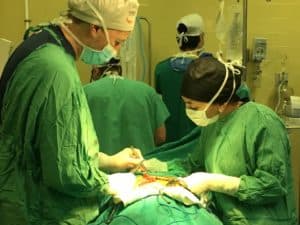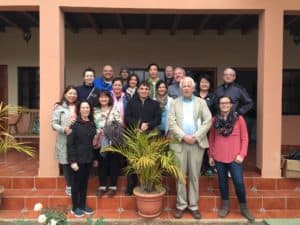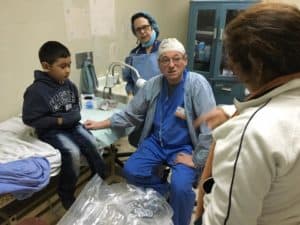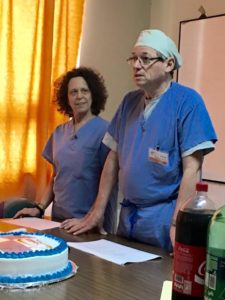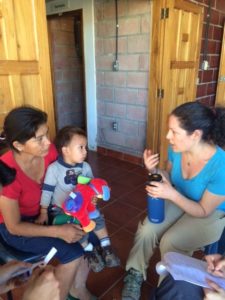Long before our arrival at Shoulder to Shoulder when Laura and I were contemplating living and working in Honduras, we took a few exploratory trips to discern where we might find a site. We attended a conference in Copan Ruinas for NGOs serving in Honduras. At this conference there were a number of folks who regularly came to Honduras on dental brigades. The dentists were bragging about the large number of extractions they had accomplished. The braggadocio with which they expressed their accomplishments gave me the sense of a gunslinger carving notches in the ivory handle of his pistol. It didn’t seem to us as if ripping teeth out of peoples’ mouths would be something that most dentists would celebrate. Yet, we were in the proverbial Rome, and we would do as the Romans.
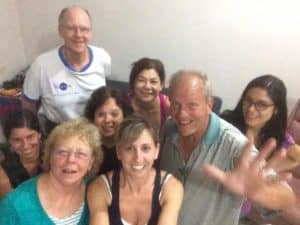
Now having lived in Honduras for some time we can easily understand why the practice of extractions, particularly in rural areas among people of extreme poverty, is so common. Dental care is either nonexistent in remote areas or inaccessible for poor people. For most suffering with chronic pain from infections and other dental complications, extractions are the only option. The dentists that come on brigades to pull teeth are offering a service that is greatly appreciated. Yet, this approach has some terrible, tragic consequences. The more these extractions become available, the more dental care becomes identified with extractions. The notion that dental care is about prevention, hygiene, and regular professional attention is completely lost. Among poor people and in extremely remote areas of Honduras, ongoing, professional, dental care is considered unnecessary.
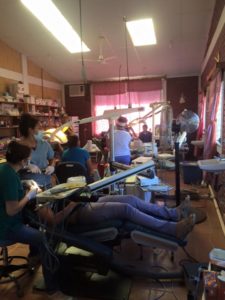
Whereas extractions might be graciously appreciated and absolutely necessary to relieve chronic pain, this is certainly not development. Actually, it is its opposite: stifling the opportunity for an understanding of the need for good, dental hygiene and ongoing professional service. It standardizes a substandard praxis that will never promote development. It is disrespectful, basically yielding to a belief that poor people do not deserve anything better than a compromised response. Why does this inequity exist? Why are we willing to relegate dental care to the pulling of teeth? Why is there little emphasis on dental hygiene and professional dental care? Why would we acquiesce to a notion of dental hygiene and care that would never be accepted in the developed United States? The answer to these questions is not challenging. It’s because it is the easy response.
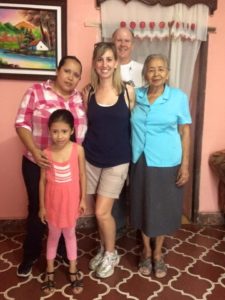
Charity, commitment in service, and development are never easy, though perhaps we would want them to be. They require engagement and investment. They require partnering. They require appreciation and respect for the potentials among the people served. They requires years, lifetimes really, of time, talent, and energy. Shoulder to Shoulder, particularly under the leadership of Jan and Larry Tepe, envisioned something more meaningful and sustainable in terms of oral hygiene and care among the people of Southern Intibucá. Shoulder to Shoulder established dental clinics with professional full time Honduran dentist in order to create and sustain the development of a culture of wellness. The simple response would have simply been to yank out pain where it was found. The just response is to eradicate the insidious systemic conditions that create the pain in the first place. The simple response takes a brigade of limited time, involvement, and relationship. The just response takes a sustained commitment of years and decades, an investment in the dignity and potential for a people’s development.
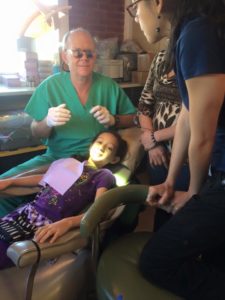
Dr. Larry Tepe, Dr. Elizabeth Mueller, Emily Mason, dental hygienist, and Cathy Doughman, dental assistant, were recently here on a one week dental brigade. They saw a great many patients. I’m certain they did a few extractions. But more important was their attention given to our Honduran dental staff. Dr. Larry spent a good deal of time repairing and maintaining our dental equipment, critical to the ongoing care at both clinics. There were long conversations in professional sharing such that the ongoing dental services continue to advance the sustainable development already achieved. There was no bragging about how many extractions had been accomplished, no notches carved into the dentists’ pliers and clamps. The success of the brigade is subtle. It is not easily identified. The celebration of the success is not to be found in the swelling of a dentist’s ego. Rather it is present in the advance of a people.
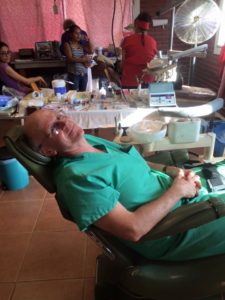
A particularly ironic occurrence on the brigade should be noted. Dr. Larry came on the brigade realizing he was actually in need of an extraction of one of his wisdom teeth. He, like most of us, would have liked to put this off. But the pain and discomfort became intolerable on one particular morning. So many US dentists have come to Honduras and extracted so many teeth. It somehow seems poetically appropriate that Dr. Larry would solicit Dr. Idalia Marilez Ramos to extract his tooth and relieve him of his pain. She did it with grace and expertise and Dr. Larry was the one who was grateful. The competence and professionalism of Shoulder to Shoulder’s dental mission is a source of tremendous pride. Shoulder to shoulder, the development of sustainable systems of well-being, make possible that which was considered impossible.
Photographs courtesy of Emily Mason’s Facebook


